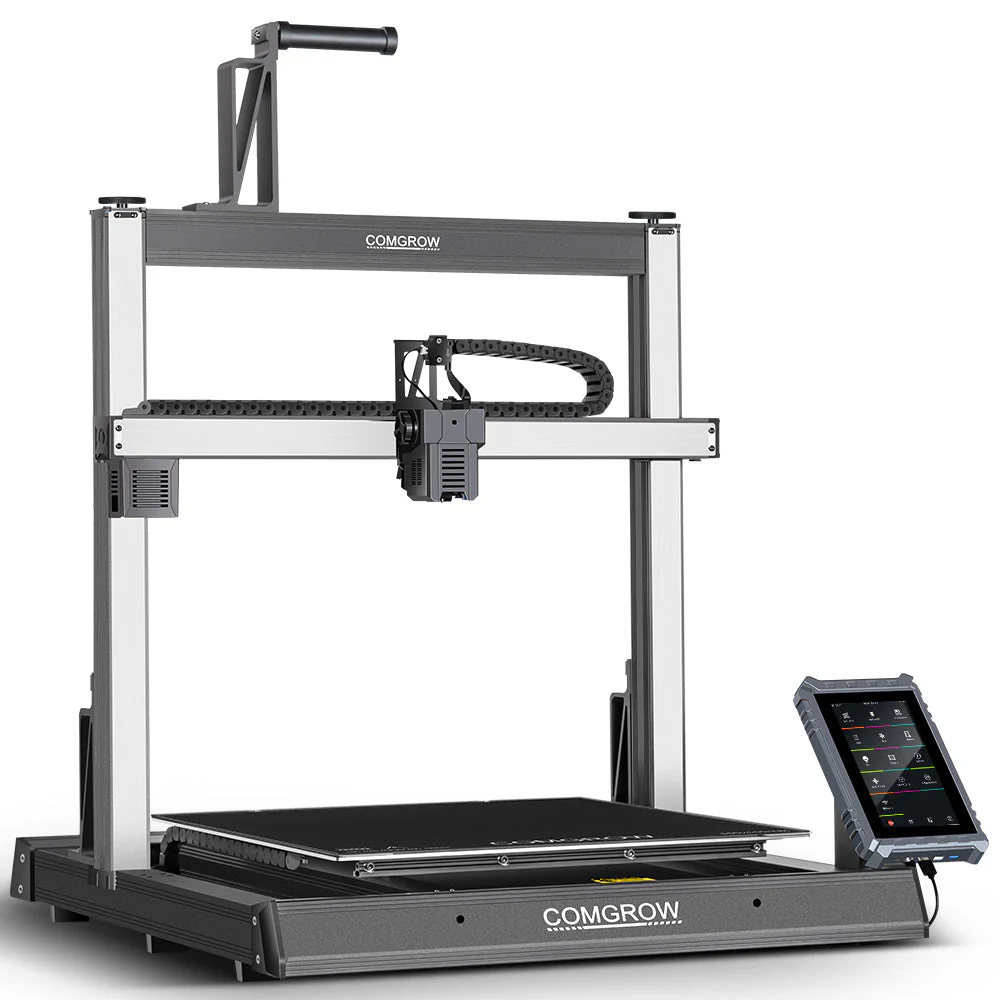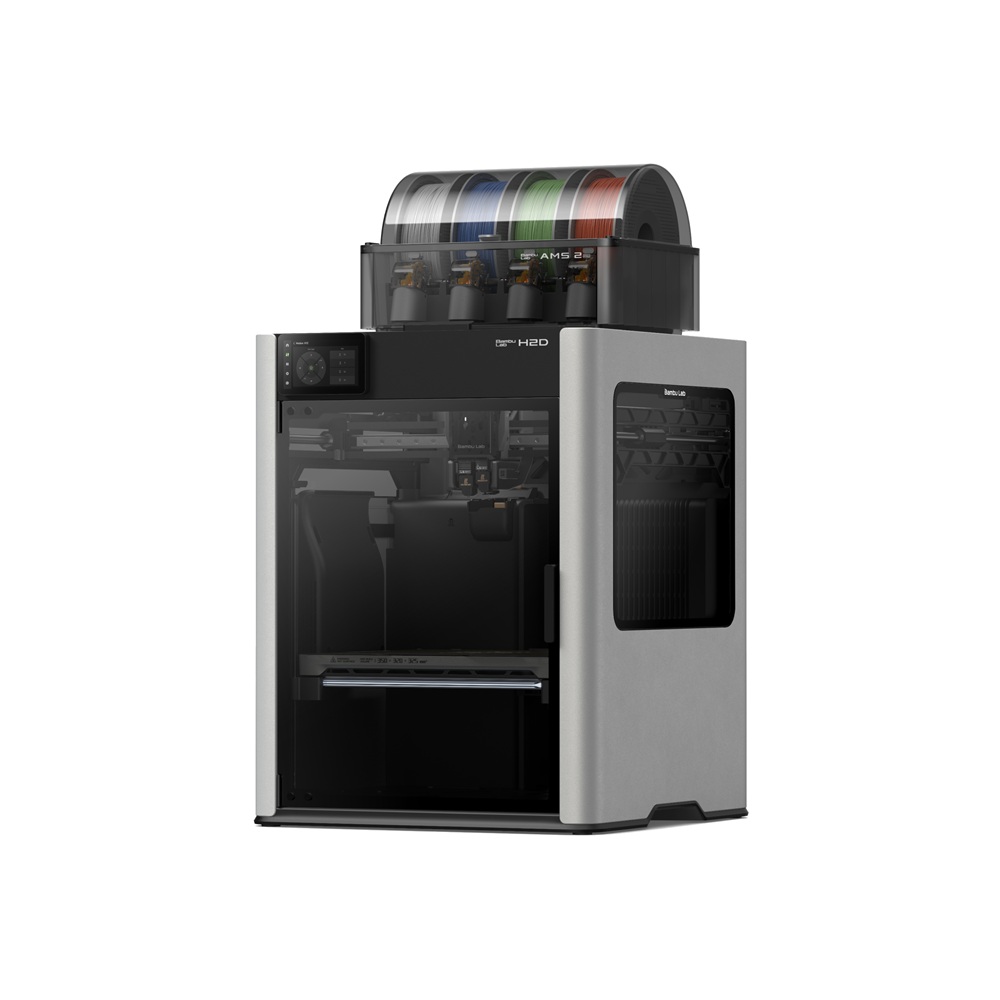Compare Comgrow T500 vs H2D
Comparison between the best 3D printers
Choose the best 3D printer at the best price. The cheapest 3D printers are here.
Buy a 3D printer here with 3D Fila.
 |
 |
|
| Model | Comgrow T500 |
H2D |
| Printing Material | Filament | Filament |
| Buy Filament for Sovol Comgrow T500 | Buy Filament forBambu Lab H2D | |
| Estimated price | $799,00 | $1899,00 |
| Manufacturer | Sovol | Bambu Lab |
| Release Year | 2024 | 2025 |
| Print Volume [mm] | 500x500x500 | 350x320x325 |
| Printer Size [mm] | 817x810x962 | 492x514x626 |
| Weight [kg] | 39 | 42,3 |
| Power Loss Recovery | YES | YES |
| Enclosed printer | NO | YES |
| Bed Leveling | Automatic | Automatic |
| Filament End Sensor | YES | YES |
| Bed type | Heated | Heated |
| Power supply system | Direct Drive | Direct Drive |
| Standard nozzle | 0,4 | 0,4 |
| Maximum Nozzle Temperature [°C] | 300 | 350 |
| Maximum Bed Temperature [°C] | 80 | 120 |
| Maximum printing speed [mm/s] | 500 | 600 |
| Filament holder | YES | YES |
| Camera for supervision | NO | NO |
| Recommended filaments | PLA, PETG, Fibra de Carbono, TPU | PLA, PETG, ABS, ASA, TPU, PVA, Nylon (PA) |
| Recommended slicers | Creality Print, Cura 5.0 ou superior, Prusa Slicer, Orca | Bambu Studio |
| Maximum Resolution [mm] | 0,1 | 0,01 |
| Processor | ||
| Display | 7'' IPS touchscreen, 60Hz | Touchscreen 5'' |
| Power Supply | 500 W | |
| Connectivity | Wifi, Bambu bus, Cartão SD | |
| Operating systems | Windows, Mac, Linux | |
| Date of registration in the system | 2024-07-18 | 2025-03-31 |
| Release date | 2024 | 2025 |
| Extra features | The Sovol Comgrow T500 stands out for its large print volume of 500x500x500 mm, ideal for large-scale projects. It has a direct extruder with a gear ratio of 6.5:1, speeds of up to 200 mm/s, and high-performance motors. The 7" touchscreen with Klipper software makes navigation easy. The 49-point automatic leveling ensures a perfect first layer. It also has a full metal hotend at 300°C, linear rails on all axes, and WiFi connectivity. | Bambu Labs H2D combines high-speed 3D printing with a chamber heated up to 65 °C, dual extrusion with automatic nozzle switching, an AMS for filament drying and exchange, and AI sensors that detect failures. It offers optional laser and digital cutting capabilities, features intelligent calibration through computer vision, vibration control, enhanced fire safety, and real-time camera monitoring. |
| Support for multiple colors and materials (AMS and CFS) | NO | YES |
Notes * |
||
| Cost-benefit | 7 / 10 | 7 / 10 |
| Hardware | 3.6 / 10 | 8 / 10 |
| Tela | . | . |
| Print volume | 5 / 10 | 4 / 10 |
| Performance | 4 / 10 | 5 / 10 |
Conclusion |
| In conclusion, the comparison between the Comgrow T500 and the Bambu Lab H2D clearly highlights the distinct advantages each printer offers, catering to different user needs and preferences. The Comgrow T500 is a cost-effective choice with a significantly larger print volume, making it ideal for hobbyists or those involved in larger projects. Its feature set includes robust automatic bed leveling, a decent maximum nozzle temperature, and an intuitive 7" touchscreen interface. While it is well-suited for a variety of filaments, its performance and additional hardware capabilities are more basic compared to the H2D. Conversely, the Bambu Lab H2D commands a higher price but integrates advanced features such as dual extrusion and a heated chamber for enhanced material compatibility and printing precision. The printer is equipped with AI sensors that improve operational reliability, including intelligent calibration and failure detection. Additionally, the H2D's ability to handle multiple materials and colors, along with its enhanced safety features, makes it a more versatile option for professionals and serious makers. Ultimately, the choice between these two models should be guided by your specific needs: the Comgrow T500 offers an excellent cost-benefit for larger scale prints, while the Bambu Lab H2D presents superior capabilities for advanced users willing to invest more for enhanced performance and functionality. |

